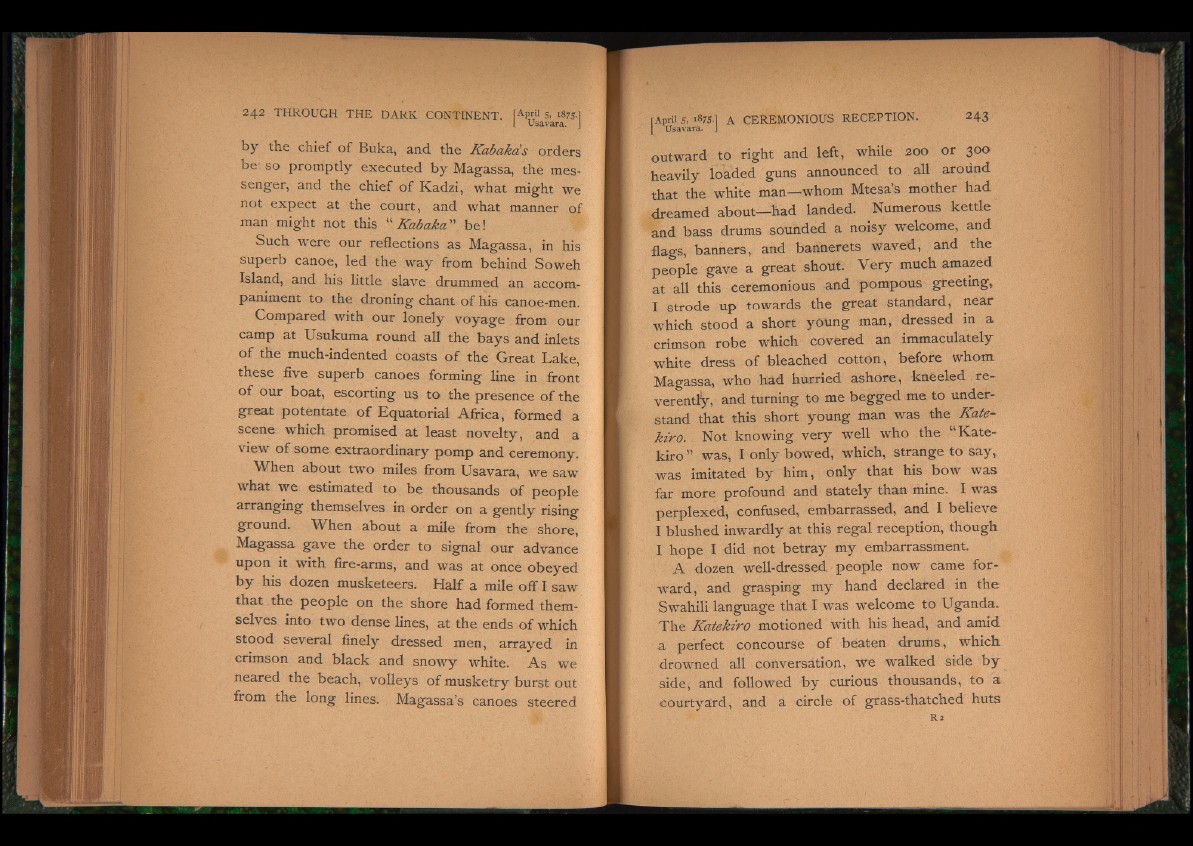
b y the chief o f Buka, and the Kabakas orders
be* so promptly executed b y Magassa, the messenger,
and the chief o f Kadzi, what might we
not expect at the court, and what manner of
man might not this “ Kabaka ” b e !
Such were our reflections as Magassa, in his
superb canoe, led the w a y from behind Soweh
Island, and his little slave drummed an accompaniment
to the droning chant o f his canoe-men.
Compared with our lonely vo y a g e from our
camp at Usukuma round all the bays and inlets
o f the much-indented coasts o f the Great Lake,
these five superb canoes forming line in front
o f our boat, escorting us to the presence o f the
great potentate o f Equatorial Africa, formed a
scene which promised at least novelty, and a
view o f some extraordinary pomp and ceremony.
When about two miles from Usavara, we saw
what w e estimated to be thousands o f people
arranging themselves in order on a gently rising
ground. When about a mile from the shore,
Magassa g a v e the order to signal our advance
upon it with fire-arms, and was at once obeyed
b y his dozen musketeers. Half a mile o ff I saw
that the p eop le on the shore had formed themselves
into two dense lines, at the ends o f which
stood several finely dressed men, arrayed in
crimson and black and snowy white. A s we
neared the beach, volleys o f musketry burst out
from the long lines. Magassa’s canoes steered
outward to right and left, while 200 or 300
heavily loaded guns announced to all around
that the white man— whom Mtesa’s mother had
dreamed about— had landed. Numerous kettle
and bass drums sounded a noisy welcome, and
flags, banners, and bannerets waved, and the
people gave a great shout. V e r y much amazed
at all this ceremonious and pompous greeting,
I strode up towards the great standard, near
which stood a short young man, dressed in a
crimson robe which covered an immaculately
white dress o f bleached cotton, before whom
Magassa, who had hurried ashore, kneeled re-
verentfy, and turning to me b eg g ed me to understand
that this short young man was the K ate-
k iro . Not knowing v e ry well who the “ Kate-
kiro ” was, I only bowed, which, strange to say,
was imitated b y him, only that his bow was
far more profound and stately than mine. I was
perplexed, confused, embarrassed, and I believe
I blushed inwardly at this regal reception, though
I hope I did not betray my embarrassment.
A dozen well-dressed people now came fo r ward,
and grasping my hand declared in the
Swahili language that I was welcome to Uganda.
T he Katekivo motioned with his head, and amid
a perfect concourse o f beaten drums, which
drowned all conversation, we walked side b y
side, and followed b y curious thousands, to a
courtyard, and a circle o f grass-thatched huts